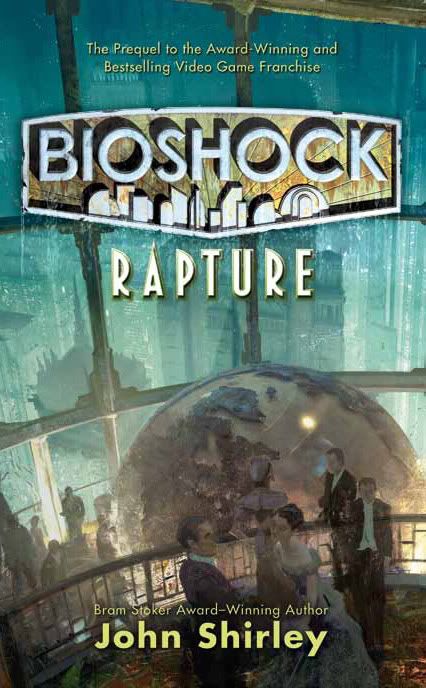With an intelligent story that’s brilliantly told, Bioshock is one of the few exceptions that proves the rule when it comes to videogame scripts. It was inspired by Ayn Rand’s love letter to capitalism, the epic novel Atlas Shrugged. Things have now come full circle, with the official Bioshock prequel on the horizon in the form of a novel. With a history which includes a Bram Stoker Award and a credit for screenwriting duties on cult movie The Crow, John Shirley is no inexperienced fan fiction teen. Does that mean he’s up to the job of making a Bioshock book work?
Bioshock: Rapture begins with the end of the Second World War. The world-changing use of the atomic bomb urges billionaire industrialist Andrew Ryan into action. He throws his time and his money into a project he has long since planned; a secular city under the ocean, isolated from the rest of the world. A city where science and business can innovate and grow without tax, without public ownership… without regulation. A city where a man owns the sweat off his own brow, and nobody else’s. The ultimate free market: Rapture.
The book gets off to something of a false start. For the first few chapters, Shirley is prone to seemingly random bouts of brief – but intense – doses of pedestrian detail when introducing new characters. Even a character who will disappear within a page or two never to be seen again may have their hair, clothes, and even skin described to the reader. Whenever this happens, it brings the narrative to a juddering halt.
Thankfully, he kicks the overdescribing habit long before the city of Rapture is even finished. Would Ryan hire the man who came to fix his toilet as chief building engineer for a secret city under the sea, though? Really? The early stages of the novel are far from a total loss though, and in fact one of the best sequences of the book is to be found in the prologue. During Ryan’s childhood flashback, there is an undeniable tension that most authors struggle to provide.

"A man chooses; a slave obeys. A dog barks; a lemon makes no sound at all. A monkey swings; a fish swims. A carrot is orange; so is an orange..." Bioshock script first draft. Maybe.
You’ll be pleased to hear that Ryan often takes centre stage throughout the novel; and in addition, almost every character in the book, no matter how big or small their part, can be found in Bioshock 1 and/or 2. The ones who were fleshed out enough to have their own identities keep those identities whenever they appear, even when in places and situations far removed from anything the games may have suggested. Kudos to Shirley for that.
Staying true to the characters comes with a few pitfalls, however. On paper, Dr Suchong’s pidgin English looks awkward and painfully stereotyped (though mercifully, his role in the story is not a major one). Fontaine features prominently, the author gleefully providing a slice of this dark horse’s unpleasant history; and this is done brilliantly. One of the main characters is Ryan’s chief building engineer Bill McDonagh however, and – to British eyes at least – attempts to emulate the dialect of a 1940s cockney are not always… palatable. The best/worst line of the book is to be found on page 222:
“These ragamuffins over ‘ere’ve been giving me the gimlet eye. Half-expecting a knock in the head.”
I promise you that these Dick Van Dyke moments are extremely few and far between, however. Generally speaking, Bill’s speech runs nice and smoothly.

"Gor blimey guv, currant bun's aht innit, apples and pears dahn to the dog an' bone, step in time, step in time, and so on and so forth."
One more character that must be mentioned is actor/playwright Sander Cohen. Flamboyant and more than a little creepy (only partly due to the reek of Sexual Predator that engulfs him), he is the most instantly memorable character in the entire novel. The only mistake Shirley makes with Cohen is underusing him, limiting this grimly fascinating man to a handful of brief appearances.
Great care has been taken to stay true to the Bioshock universe. Not only people, but places and events have been taken straight out of the games – neither underused nor overused. There’s a perfect mix of original writing (which dominates) and existing history; which sometimes even extends to dialogue lifted straight from audio diaries. Some questions you may have are answered, while others are frustratingly skirted.
If you’re expecting a detailed explanation of the science behind plasmids, Adam, Little Sisters and Big Daddies for example, you’ll be disappointed. There’s little more than vague talk of genes and stem cells. The sociological history of these developments, however, is painted wonderfully; though only a little of the mystery shrouding Big Daddies is torn away.
Overall it’s a convincing and riveting portrait of Ryan and Rapture, and how they both fell apart – and how neither was particularly secure to begin with. It’s been so carefully crafted to please and respect Bioshock fans, you rarely doubt that this is how it really happened. If you ever do, it’s never for more than a second or two – you’ll be too eager to see what happened next. It’s so authentically Bioshock in fact, that the book (unintentionally) highlights two gaping plot holes in the first game which have always bothered me.
To top it all off Shirley manages to provide a touching, bittersweet ending that somehow sidesteps schmaltz. You don’t need to have played either game to enjoy Bioshock: Rapture, but there’s a substantial extra layer for those that have. It’s best to have played the games first however because, being a prequel, there are spoilers here; particularly for the first game.
Bioshock: Rapture necessarily runs in parallel to Atlus Shrugged in some respects (and there are a few subtle hints that Shirley has read it), but it’s hundreds of times better than that godawful mess of a book. Now, would you kindly order yourself a copy!
Bioshock: Rapture will be published in the UK by Titan Books July 19th.




You call yourself the critical gamer? Try being critical then – that book was utter, horrid shite. Need to find yourself a new name.